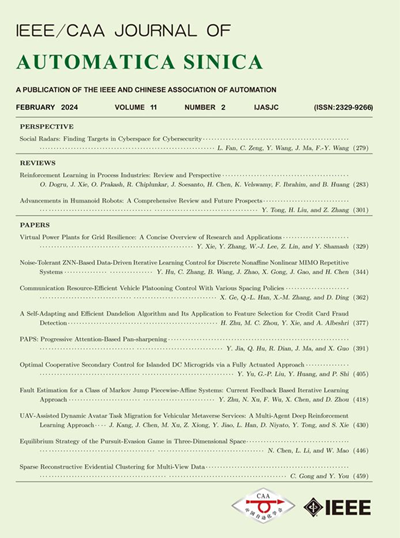Deterministic Learning-Based Neural PID Control for Nonlinear Robotic Systems
IF 15.3
1区 计算机科学
Q1 AUTOMATION & CONTROL SYSTEMS
引用次数: 0
Abstract
Traditional proportional-integral-derivative (PID) controllers have achieved widespread success in industrial applications. However, the nonlinearity and uncertainty of practical systems cannot be ignored, even though most of the existing research on PID controllers is focused on linear systems. Therefore, developing a PID controller with learning ability is of great significance for complex nonlinear systems. This article proposes a deterministic learning-based advanced PID controller for robot manipulator systems with uncertainties. The introduction of neural networks (NNs) overcomes the upper limit of the traditional PID feedback mechanism's capability. The proposed control scheme not only guarantees system stability and tracking error convergence but also provides a simple way to choose the three parameters of PID by setting the proportional coefficients. Under the partial persistent excitation (PE) condition, the closed-loop system unknown dynamics of robot manipulator systems are accurately approximated by NNs. Based on the acquired knowledge from the stable control process, a learning PID controller is developed to further improve overall control performance, while overcoming the problem of repeated online weight updates. Simulation studies and physical experiments demonstrate the validity and practicality of the proposed strategy discussed in this article.非线性机器人系统的基于确定性学习的神经 PID 控制
传统的比例积分派生(PID)控制器在工业应用中取得了广泛的成功。然而,尽管现有的 PID 控制器研究大多集中于线性系统,但实际系统的非线性和不确定性不容忽视。因此,开发具有学习能力的 PID 控制器对于复杂的非线性系统具有重要意义。本文针对具有不确定性的机器人机械手系统提出了一种基于确定性学习的先进 PID 控制器。神经网络(NN)的引入克服了传统 PID 反馈机制能力的上限。所提出的控制方案不仅保证了系统的稳定性和跟踪误差收敛性,而且提供了一种通过设置比例系数来选择 PID 三个参数的简单方法。在部分持续激励(PE)条件下,机器人机械手系统的闭环系统未知动态可通过 NN 精确逼近。基于从稳定控制过程中获得的知识,开发了学习型 PID 控制器,以进一步提高整体控制性能,同时克服了反复在线权值更新的问题。仿真研究和物理实验证明了本文所讨论的建议策略的有效性和实用性。
本文章由计算机程序翻译,如有差异,请以英文原文为准。
求助全文
约1分钟内获得全文
求助全文
来源期刊

Ieee-Caa Journal of Automatica Sinica
Engineering-Control and Systems Engineering
CiteScore
23.50
自引率
11.00%
发文量
880
期刊介绍:
The IEEE/CAA Journal of Automatica Sinica is a reputable journal that publishes high-quality papers in English on original theoretical/experimental research and development in the field of automation. The journal covers a wide range of topics including automatic control, artificial intelligence and intelligent control, systems theory and engineering, pattern recognition and intelligent systems, automation engineering and applications, information processing and information systems, network-based automation, robotics, sensing and measurement, and navigation, guidance, and control.
Additionally, the journal is abstracted/indexed in several prominent databases including SCIE (Science Citation Index Expanded), EI (Engineering Index), Inspec, Scopus, SCImago, DBLP, CNKI (China National Knowledge Infrastructure), CSCD (Chinese Science Citation Database), and IEEE Xplore.
 求助内容:
求助内容: 应助结果提醒方式:
应助结果提醒方式:


